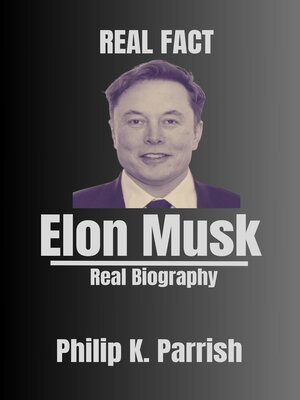
Sign up to save your library
With an OverDrive account, you can save your favorite libraries for at-a-glance information about availability. Find out more about OverDrive accounts.
Find this title in Libby, the library reading app by OverDrive.



Search for a digital library with this title
Title found at these libraries:
| Library Name | Distance |
|---|---|
| Loading... |
Do you want clear, concise and easy-to-read biography without being overwhelmed with fluff? If yes, then continue Reading.
This is the incredibly personal tale of our age's most intriguing and contentious innovator—a rule-breaking visionary who helped usher the world into the era of electric automobiles, private space exploration, and artificial intelligence. Oh, and he also took over Twitter.
Bullies often abused Elon Musk as a child in South Africa. One day, a gang shoved him down some concrete stairs and kicked him until his face swelled to the size of a bulging ball of flesh. He was hospitalized for a week. The physical wounds, however, paled in comparison to the mental scars left by his father, an engineer, rogue, and charming fantasist.
His father's influence on his mentality would last a lifetime. He grew into a tough but fragile man-child, prone to sudden Jekyll-and-Hyde mood swings, with an abnormally high risk tolerance, a taste for drama, an epic sense of purpose, and a manic intensity that was harsh and at times destructive.
At the start of 2022, after a year that saw SpaceX fly 31 rockets into space, Tesla sell a million automobiles, and Musk become the wealthiest man on the planet, Musk talked ruefully about his desire to create drama. "I need to shift my mindset away from being in crisis mode, which it has been for about fourteen years now, or arguably most of my life," he said.
It was a sentimental remark, not a New Year's resolution. Even as he said it, he was covertly purchasing Twitter stock, the world's ultimate playground. Whenever he was in a bad mood, his thoughts would go back to being bullied on the playground. He now had the opportunity to acquire the playground.
For two years, Isaacson followed Musk around, attending his meetings, walking through his factories with him, and interviewing him, his family, friends, employees, and rivals. The result is a riveting inside narrative replete with incredible stories of victory and adversity that asks the question: do the demons that drive Musk also fuel creativity and p
rogress?







